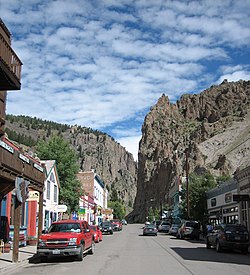Creede, Colorado
| City of Creede, Colorado | |
|---|---|
| Statutory Town | |

Downtown Creede
|
|
| Motto: There is no night in Creede! | |
 Location in Mineral County and the State of Colorado |
|
| Coordinates: 37°50′57″N 106°55′31″W / 37.849102°N 106.925415°WCoordinates: 37°50′57″N 106°55′31″W / 37.849102°N 106.925415°W | |
| Country |
|
| State |
|
| County | Mineral County Seat |
| Incorporated | May 19, 1892 |
| Government | |
| • Type | Statutory Town |
| Area | |
| • Total | 0.6 sq mi (1.6 km2) |
| • Land | 0.6 sq mi (1.6 km2) |
| • Water | 0 sq mi (0 km2) |
| Elevation | 8,799 ft (2,682 m) |
| Population (2010) | |
| • Total | 290 |
| • Density | 480/sq mi (180/km2) |
| Time zone | MST (UTC-7) |
| • Summer (DST) | MDT (UTC-6) |
| ZIP Code | 81130 |
| Area code(s) | 719 |
| INCITS place code | 0814765 |
| GNIS feature ID | 2412384 |
| Website | City website |
The historic City of Creede is the Statutory Town that is the county seat and the only incorporated municipality in Mineral County, Colorado, United States. The town population was 290 at the 2010 United States Census.
Travelers to this area appeared in the early 19th century. Tom Boggs, a brother-in-law of Kit Carson, farmed at Wagon Wheel Gap in the summer of 1840. The first silver discovery was made at the Alpha mine in 1869, but the silver could not be extracted at a profit from the complex ores. Ranchers and homesteaders moved in when stagecoach stations (linking the mining operations over the Divide with the east) were built in the 1870s, but the great “Boom Days” started with the discovery of rich minerals in Willow Creek Canyon in 1889.
Creede was the last silver boom town in Colorado in the 19th century. The town leapt from a population of 600 in 1889 to more than 10,000 people in December 1891. The Creede mines operated continuously from 1890 until 1985, and were served by the Denver & Rio Grande Railroad.
The original townsite of Creede was located on East Willow Creek just above its junction with West Willow Creek. Below Creede were Stringtown, Jimtown, and Amethyst. The Willow Creek site was soon renamed Creede after Nicholas C. Creede who discovered the Holy Moses Mine. Soon the entire town area from East Willow to Amethyst was called Creede.
At the same time that Creede was booming, the capital city of Denver, Colorado was experiencing a major legal reform movement against gambling clubs and saloons. Numerous owners of major gambling houses in Denver quickly relocated to Creede's business district. One of these relocators was the infamous confidence man Jefferson Randolph "Soapy" Smith. Soapy became the uncrowned king of Creede's criminal underworld, and opened the Orleans Club. Other famous people in Creede were Robert Ford (the man who killed outlaw Jesse James), Bat Masterson, and William Sidney "Cap" Light (the first deputy sheriff in Creede, and brother-in-law of Soapy Smith). On June 5, 1892 a major fire destroyed most of the business district. Three days later, on June 8, Ed O'Kelley walked into Robert Ford's makeshift tent-saloon and shot him dead. The town of Creede was incorporated on June 13, 1892, but the anti-gambling reform movement in Denver had ceased, and the Denver businessmen moved back to their old stomping grounds.
...
Wikipedia
